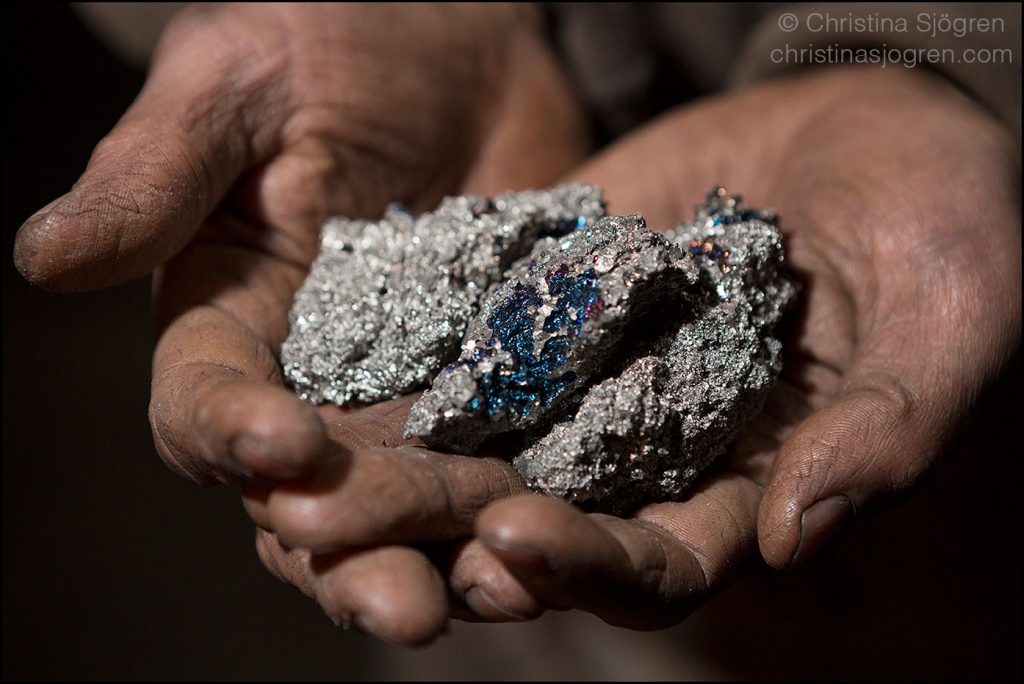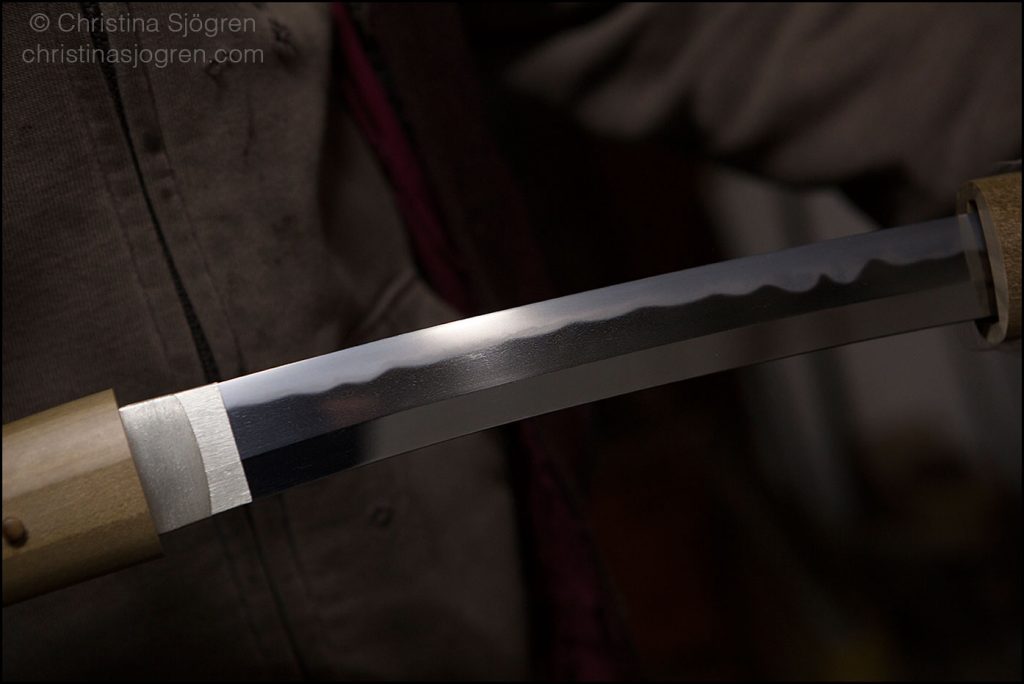Swedish-born Yasha Yukawa had to surrender himself to endure the tough path to becoming a swordsmith in Japan.
Text: Kajsa Skarsgård Photos: Christina Sjögren
Driving through the valleys outside Hofu in Yamaguchi Prefecture, Yasha Yukawa scouts the surrounding rice paddies with his gaze. He is constantly searching for rice straw, but only the farmers that harvest by hand preserve it.
“The people who live there harvest by hand”, he says and points towards a house with a paddy where last years’ stems stick out of the ground. “But they give their straw to the local Shinto shrine for making shimenawa, the rope enclosing the sacred place.”
Yasha Yukawa needs one paddy field of rice straw a year for making his swords. He burns the straw slowly, one bundle at the time, so that important qualities are not lost. The straw ash and clay is used as a protective layer around the steel when it is heated.
The road narrows as it winds up towards the small mountain village where Yasha Yukawa’s forge is found, surrounded by cherry blossom in the spring. From here he can hear the stream running through the forest; it is where he fetches water for the quenching of the steel.
The forge is old and simple. Yasha Yukawa took it over when its previous swordsmith passed on a few years ago. The walls are of corrugated metal, and out of the earthen floor the furnace raises like two mountain ranges divided by a gorge where the charcoal lies.
Just to learn to cut the red-pine charcoal by hand, in the right way and in the right sizes for the different steps in the swordmaking process, is supposed to take three years.
“I am pretty good at it now,” says Yasha Yukawa, speaking in Swedish with a clear Stockholm accent.
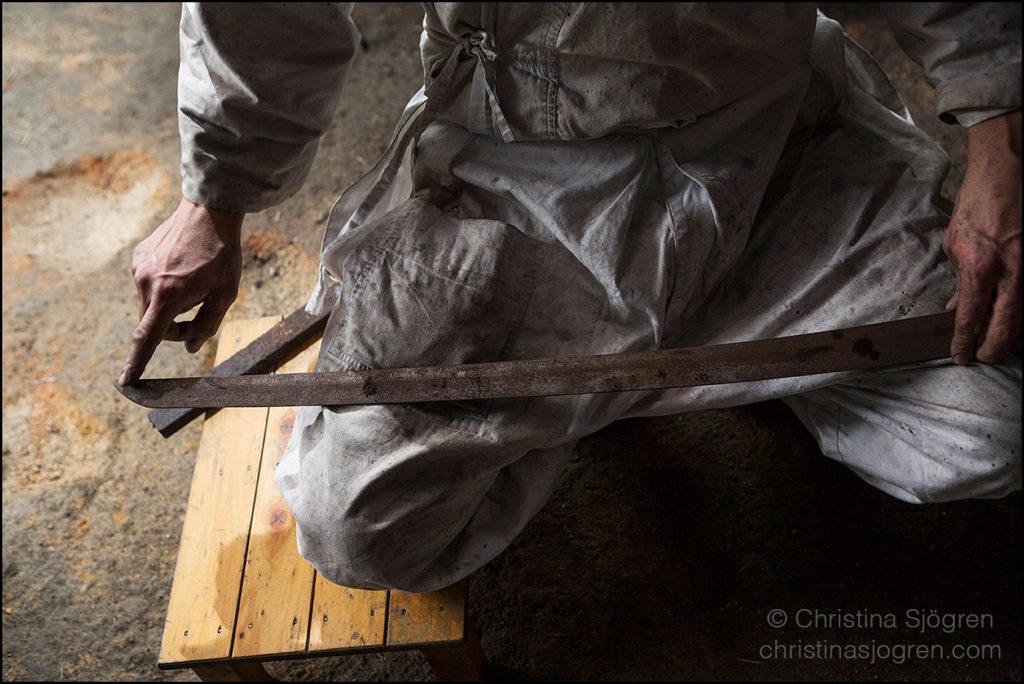
It has been nine years since he showed up on the doorstep of his master, Matsuba Kunimasa, to become his apprentice. Yasha Yukawa didn’t wear suitable work clothes and immediately received a scolding. At that time he couldn’t even imagine how tough the path would be to becoming a licensed swordsmith in Japan.
A couple of months earlier, he woke up after a nap in his cabin in the Swedish countryside, having dreamt of a katana sword. The picture of it was engraved in his mind and he felt a great urge to become a swordsmith.
Encouraged by his girlfriend, he immediately called Matsuba Kunimasa, the swordsmith Yasha Yukawa had met a decade before at the wedding of his father, a Japanese artist who had also run a karate dojo and a sword appreciation club in Stockholm.
Yasha Yukawa told Matsuba Kunimasa over the phone that he wanted to be a swordsmith. “It is impossible,” the master claimed, but asked him to send an e-mail.
Yasha Yukawa, 37 years at that time, didn’t have internet at home so he went to the public library in a nearby town to e-mail Matsuba Kunimasa. He accepted Yasha Yukawa’s wish to become his apprentice, but strongly discouraged him to go through with it, saying it would take him 15 years to learn and that he would never pass the swordsmith licensing test.
In a matter of weeks Yasha Yukawa and his girlfriend sold everything they had in Sweden and moved to Matsuba Kunimasa’s village in Miyazaki Prefecture.
Up to this moment he had mainly been a painting artist, and during a long period in the 1980’s and 1990’s he had worked as a graffiti muralist Tokyo. He had also toured around Sweden with a puppet theatre and made music. The profit from selling all his analogue 1980’s synths facilitated the move.
After the scolding for not turning up adequately dressed, Yasha Yukawa started the shugyo, the austere traditional training.
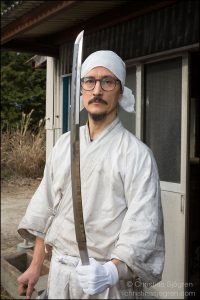
The first months he was expected to learn just by attentively following his master’s work with his eyes, and then suddenly Yasha Yukawa was thrown into different tasks. If he asked a question his master got angry and let him know that he would never become a swordsmith if he didn’t have the answer himself.
“As an apprentice you have to take mental beatings and you get broken down. If you take it personally it becomes unbearable,” says Yasha Yukawa. “I had to erase the illusion of myself as a person, but I was seeking this because that illusion stands in the way of the absolute state of being. It was very tough at the time, but now I am grateful for it.”
After five hard years of unpaid apprenticeship, done over the course of seven years because his father fell ill and then passed away in Sweden, Yasha Yukawa did the mandatory test in order to be allowed to forge swords in Japan.
The first year he failed, like everybody else in the group. But he gave it another try.
“It is among the most arduous projects I have ever undertaken,” he says. “And I was working with a crushed thumb and deep burns and cuts on my hands.”
The exam stretched over eight long days. Five of Japan’s leading swordsmiths and representatives from the Ministry of Culture closely followed all the steps in the process, taking notes and looking at their watches to ensure that the candidates kept the tight time schedule by the second.
Mental strength was crucial to be able to perform the difficult tasks under that pressure.
The examiners critically scrutinized every detail of his work, but after they had spilt his completed sword in two and announced that he had passed the test, he was warmly congratulated by them.
Yasha Yukawa was officially a traditional Japanese swordsmith, and, as far as he knows, the only one with a foreign heritage.
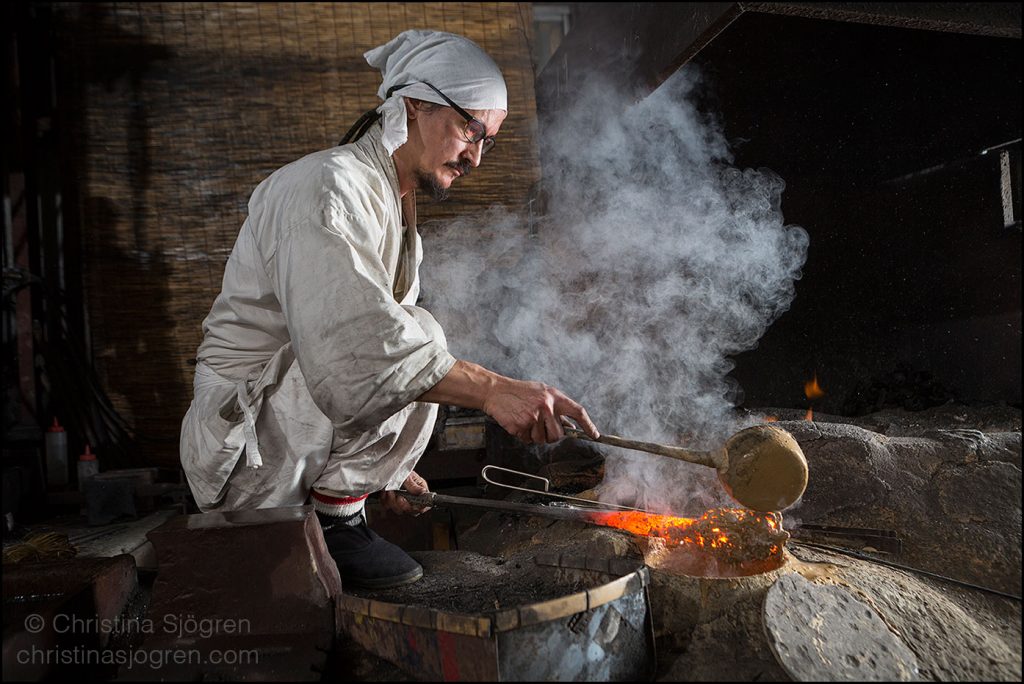
Matsuba Kunimasa cried when he received the news over the phone. Since that day Yasha Yukawa freely asks him questions, and his former master helps him manoeuvre the very strict governmental regulations of sword-making, restrictions that date back to the American occupation after World War II.
Now Yasha Yukawa can celebrate 46 years of life, and two as an independent swordsmith under the name Kagami Yashamaro. But he doesn’t keep track of time; he loses the sense of it in the forge where he continues the work developed by swordsmiths over the course thousands of years.
He lights the charcoal in the furnace and waits until the colour reveals that the temperature is right.
Out of glistening lumps of tamahagane steel, exclusively produced for Japanese swordsmiths, he has forged thin plates of steel that he breaks into pieces. He stacks them like a multi-layered puzzle, wraps it in paper and covers it in straw ash and clay-slurry before leaving it under the glowing charcoal.
“It is almost like weaving in steel, because I combine pieces with different qualities,” Yasha Yukawa explains.
He is standing in a hole in the ground in the forge, from which he can reach all the tools and workspaces he needs. With a rocking motion he pushes the Japanese style bellow back and forth; his gaze is on the flames as he listens for the sound of boiling steel.
Suddenly he intensifies the breath of the bellow. He uses his free hand to turn on the power hammer. It is the only semi-modern tool that is considered not to affect the quality of the steel if it is used instead of a sledgehammer early in the process.
The dai,the end of the bar that his puzzle of steel pieces balanced on, looks like one big chunk of beaming steel when he puts it under the hammer to unify the pieces.
Then it is heated again, and using a chisel he beats a deep cut in the steel and doubles it with the force of his own hammer blows. He does this over and over again, until the steel has been folded into thousands of layers.
The first time Yasha Yukawa hardened his own sword, he came closer to comprehending why he felt a great calling to become a swordsmith.
“The glowing sword heeled when I quenched it in the water, and when I took it up it was as if a living essence had been born,” he says.
His understanding of the sword’s meaning, and his own relationship to it, has deepened over the years.
“It is a weapon of noble and enlightening properties that are created in almost magical circumstances. From this, spiritual dimensions grow and the Japanese sword becomes a talisman,” Yasha Yukawa says.” “To me, the sword is an expression of the Absolute.”
Published in The Japan Times, May 17th, 2018.
More photos from Fukushima can be found on Christina Sjögren’s website.

